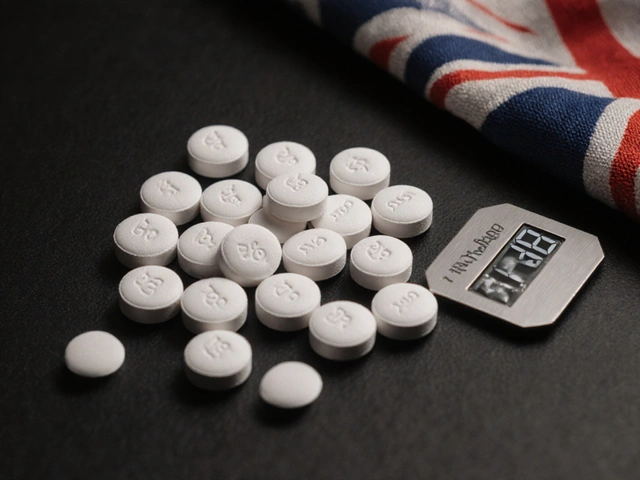You want fast, safe relief from reflux or stubborn heartburn without paying brand prices-and you want it online, today. Here’s the catch: with medicines, “cheap” can get risky fast if you don’t know what to look for. I’ll show you how to buy generic esomeprazole (the active ingredient in Nexium) online from licensed UK pharmacies, what a fair price looks like in 2025, when you actually need a prescription, and smart alternatives that save money without cutting corners.
What you’re buying: generic Nexium explained (benefits, specs, who it’s for)
Nexium is a brand name for esomeprazole, a proton pump inhibitor (PPI). The generic is simply “esomeprazole.” Same active ingredient, same strength options, and-when it’s a licensed product from a UK pharmacy-equivalent in quality to the brand. Generics meet the same MHRA standards for safety, quality, and effectiveness.
If you’re trying to buy generic Nexium online, you’re looking for “esomeprazole 20 mg” for short‑term relief of reflux/heartburn or prescription strengths (often 40 mg) for diagnosed conditions like GORD, erosive oesophagitis, or H. pylori eradication regimens-prescribed by a clinician.
Why people pick esomeprazole:
- Once-daily dosing for most use cases.
- Good control of reflux symptoms when antacids and alginates aren’t enough.
- Generic pricing often beats brand Nexium.
Who it’s for (in general): adults with frequent heartburn or acid reflux. OTC esomeprazole 20 mg is usually taken once daily for up to 14 days for short-term symptom relief. Anything beyond that should go through your GP or a prescribing pharmacist. NHS, NICE, and the BNF all treat PPIs as standard care for reflux conditions, with the usual advice: use the lowest effective dose for the shortest necessary time.
Who should pause and speak to a clinician first: anyone with red-flag symptoms (difficulty swallowing, persistent vomiting, unexplained weight loss, vomiting blood, black stools, chest pain, new symptoms after age 55), women who are pregnant or breastfeeding, and people on complex meds (especially clopidogrel, warfarin, certain anti-fungals, high-dose methotrexate, or HIV meds). NHS and MHRA safety communications highlight these points regularly.
UK prices, doses, and delivery terms (what “cheap” should look like in 2025)
What to expect right now in the UK:
- OTC esomeprazole 20 mg (14 tablets): roughly £3.50-£6.00 for generic; brand “Nexium Control” often £7.50-£12.00.
- OTC esomeprazole 20 mg (28 tablets, where offered): typically £6.50-£10.00 generic; brand up to ~£16-£20.
- Prescription esomeprazole 20-40 mg (28-30 tablets) privately online: medicine £4-£12, plus an online consultation/prescribing fee (often £10-£25). Total commonly £15-£30 delivered.
- On the NHS in England: one prescription charge per item (currently £9.90). In Scotland, Wales, and Northern Ireland, prescriptions are free.
- Delivery: most UK online pharmacies offer 24-72 hour delivery. Expect £0-£3.99 for standard post; many waive fees above a spend threshold.
Fair price check: if a site sells “esomeprazole 20 mg 14 tablets” for under £2 or is throwing in “two-for-one worldwide,” be cautious. If it’s 2-3× the usual UK price with vague packaging details, that’s a different red flag. Reasonable prices tend to cluster in those ranges above.
Dosing basics (always follow the label or your prescriber’s advice):
- OTC use: 20 mg once daily for up to 14 days. Swallow whole with water, usually before breakfast. Relief starts within a day or two; full effect can take 2-3 days.
- Prescription use (like 40 mg or longer courses): this is for diagnosed conditions, reflux with complications, or when OTC hasn’t controlled symptoms. That’s clinician territory.
Storage and packaging: UK‑licensed esomeprazole is supplied in blister packs or bottles, with a Patient Information Leaflet, batch number, and expiry date. Keep below 25°C and away from kids. Don’t crush or chew-these are gastro‑resistant tablets/capsules.

How to buy generic esomeprazole online safely (step‑by‑step)
Buying medicines online in the UK is legal and safe when you use regulated pharmacies. Here’s the simple way to keep it legit and avoid fakes:
- Check the regulator badges: look for a GPhC‑registered pharmacy and the MHRA Distance Selling logo. You should be able to click to a page that shows their registration details.
- Verify the pharmacy’s GPhC number: copy the registration number and check it on the General Pharmaceutical Council’s online register. You’ll see the pharmacy name, address, superintendent pharmacist, and status. If it’s not there, walk away.
- Expect a questionnaire: UK law requires a clinical check, even for OTC P‑medicines sold at a distance. If a site sells PPIs without asking basic health questions, that’s a warning sign.
- Read the listing carefully: it should say “esomeprazole 20 mg,” state the pack size, licence holder, and include a clear Patient Information Leaflet reference. Vague brand‑washed names or missing strength details are not okay.
- Compare total cost, not just the sticker price: add the consultation fee (if any), delivery, and taxes. A “£2 medicine” with a £7.99 delivery fee isn’t a bargain.
- Payment and privacy: use secure checkout (padlock in the browser), UK contact details, and a clear privacy policy. Avoid bank transfers. Card or PayPal gives you protection.
- Delivery promise: for most of mainland UK you should see delivery in 24-72 hours. Cold-chain isn’t needed for esomeprazole, so standard tracked post is fine.
- Returns: pharmacies usually can’t accept returns of medicines. Check the policy before you buy, especially if you’re ordering multiple packs.
When you might need a prescription: any strength over 20 mg for reflux, long-term supply, or treatment of diagnosed conditions. Many UK online services include a private prescription after a clinician reviews your questionnaire. You’ll see a prescriber’s name and registration (GMC, NMC, or GPhC independent prescriber) in your order records. No prescriber details = not okay.
Safety tips worth repeating, based on NHS/NICE/MHRA guidance:
- Use PPIs for the shortest time that controls symptoms. If you’re still reaching for them month after month, you need a review.
- Watch for interactions: avoid esomeprazole with clopidogrel unless your doctor says otherwise; it can reduce clopidogrel’s effect. Warfarin requires monitoring. Tell the pharmacist your meds.
- Side effects: headache, tummy upset, diarrhoea/constipation are the common ones. Serious reactions are rare but need urgent care-rash with blistering, swelling, breathing trouble.
- Long-term risks exist: low magnesium or B12, fractures in high-risk groups, and infections like C. difficile, especially in hospital settings. These are mainly concerns with long courses; that’s why reviews matter.
- Stopping a PPI: if you’ve been on it for a while, taper rather than stopping overnight to avoid rebound acid. Your clinician can plan a step-down.
Compare your options: esomeprazole vs omeprazole and other budget‑friendly choices
Sometimes the cheapest fix isn’t esomeprazole-it’s a close cousin or even a non‑PPI. Quick map of the landscape:
| Option | Typical UK cost (2025) | Access | When it fits | Watch‑outs |
|---|---|---|---|---|
| Esomeprazole 20 mg (generic) | £3.50-£6.00 (14 tabs OTC) | OTC (P‑medicine) with pharmacist check | Frequent heartburn needing stronger, steady control | Interaction with clopidogrel; not for under 18 without advice |
| Omeprazole 20 mg (generic) | £1.50-£4.00 (14 tabs OTC) | OTC (P‑medicine) | Often the most cost‑effective PPI for many adults | Same clopidogrel caution; similar side‑effect profile |
| Pantoprazole 20 mg | £3-£6 (varies by retailer) | OTC or Rx depending on product | Alternative PPI; sometimes chosen if on clopidogrel | Still needs pharmacist screening |
| Lansoprazole 15 mg | £2-£5 (OTC packs) | OTC (some packs) or Rx | Similar effectiveness; often low cost | Check interactions; take as advised |
| Famotidine (H2 blocker) | £3-£7 (OTC) | OTC | On‑demand relief; useful if you want to avoid PPIs | Can be less potent for severe reflux |
| Alginates/antacids (e.g., sodium alginate mixes) | £3-£8 per bottle/pack | OTC | Great after meals or at bedtime for symptom flare‑ups | Short‑acting; combine with lifestyle tweaks |
Heuristics you can use right now:
- If symptoms are mild and occasional: start with alginates after meals and at bedtime. Many people don’t need a PPI at all.
- If you need daily control for 1-2 weeks: choose a low‑cost OTC PPI (omeprazole or esomeprazole 20 mg). Buy the smallest pack first to see if it helps.
- If you’re on clopidogrel: avoid omeprazole/esomeprazole unless a clinician says otherwise. Ask about pantoprazole or other options.
- If symptoms return when you stop: book a review. You might need a taper, an H. pylori test, or a different dose plan.
- Night‑time symptoms: consider adding an alginate at bedtime even if you’re on a PPI. Cheap and often effective.
Lifestyle tweaks that make medicine work better (NHS‑backed common sense): raise the head of your bed, avoid big meals late at night, cut back on alcohol, caffeine, and very fatty or spicy foods, stop smoking, and keep trim around the middle. These don’t cost much and often reduce how much medicine you need.

FAQ and next steps (clear answers, no jargon)
Is generic esomeprazole as good as Nexium?
Yes. UK‑licensed generics must match the brand for quality and effect. The difference is branding and inactive ingredients, not the active medicine.
Do I need a prescription to buy it online?
For 20 mg OTC packs used short‑term, no prescription is needed-but a pharmacist still screens your answers. For higher doses, longer courses, or specific conditions, a prescriber has to approve it.
How fast does it work?
You may feel better within 24 hours; the full effect can take 2-3 days. Some people notice steady improvement across the first week.
How do I take it?
Swallow the tablet whole with water, ideally before breakfast. Don’t crush or chew-these tablets are designed to survive stomach acid and release in the gut.
Is it safe in pregnancy or breastfeeding?
Speak to your midwife, GP, or pharmacist. In pregnancy, alginates are often tried first. Omeprazole has the most pregnancy data. Esomeprazole may be used if a clinician advises it for you.
What about long‑term risks?
With long courses, there’s a small risk of low magnesium or B12, and a higher chance of certain infections, especially in hospital settings. NICE and BNF recommend reviews and the lowest effective dose strategy.
Can I drink alcohol with it?
Alcohol can trigger reflux. The medicine will still work, but cutting back usually helps more than you think.
Can I take it with painkillers?
PPIs are often used to protect the stomach when people need NSAIDs (like ibuprofen). But check your full meds list with a pharmacist-there can be interactions or better plans.
What if I miss a dose?
Take it when you remember unless it’s close to the next dose. Don’t double up.
Signs I should stop and get help?
Swallowing pain, unintentional weight loss, bleeding (vomit looks like coffee grounds, or black stools), persistent vomiting, chest pain, or symptoms that don’t settle after 14 days-speak to a clinician.
Can I return it if I change my mind?
Usually no-UK pharmacies can’t accept returned medicines for safety reasons. Check the policy before you buy.
Next steps if you’re buying today:
- Decide if you need OTC (short‑term) or a prescription (longer‑term/stronger dose). If you’re unsure, start with the smallest OTC pack after a pharmacist chat.
- Pick a licensed UK online pharmacy: verify GPhC registration and the MHRA Distance Selling logo.
- Complete the health questionnaire honestly: list meds, allergies, and red‑flag symptoms.
- Compare total price (medicine + any consult fee + delivery). If you use PPIs often, consider an NHS prescription review or a prepayment certificate to cut costs.
- Set a reminder: 14‑day OTC trial max before you reassess. If symptoms are back in a month, book a review rather than buying endless boxes.
Quick troubleshooting:
- Still getting breakthrough heartburn on day 3-4: add an alginate after meals and at bedtime for a few days.
- Morning dose doesn’t feel enough: make sure you’re taking it before food. Consistency matters.
- Loose stools or headaches: usually settle. If severe or persistent, stop and speak to a clinician.
- Coming off after weeks or months: taper every few days (e.g., every other day for a week, then stop) to dodge rebound acid. Use alginates during the step‑down.
Why trust this approach? It lines up with NHS patient advice, NICE guidance on dyspepsia and GORD management, BNF dosing/safety notes, and MHRA rules on online medicine sales. If a website asks no questions, shows no registration, or shouts miracle discounts, it’s not just “cheap”-it’s a risk. Stick with licensed UK pharmacies, compare the true price, and choose the lightest treatment that actually helps.



liam coughlan
Just grabbed a 14-day pack of generic esomeprazole for £4.20 from a GPhC-registered site. Worked like a charm. No drama, no weird side effects. Saved me a fortune vs. Nexium Control.
Maeve Marley
I’ve been on PPIs for years after my H. pylori cleared, and honestly? The NHS prescription at £9.90 is still the smartest move if you’re using it regularly. I used to buy online ‘deals’ until I got a weird rash-turned out the batch wasn’t UK licensed. Lesson learned: if it looks too good to be true, it’s probably a ghost pharmacy. Stick to the GPhC register. It’s not sexy, but it’s your stomach you’re protecting.
James Gonzales-Meisler
‘Esomeprazole’ is misspelled as ‘Esomeprazole’ in the third paragraph. Also, ‘GORD’ should be ‘GERD’ if you’re targeting a global audience. And why is ‘P‑medicine’ hyphenated inconsistently? This guide reads like it was written by someone who’s never edited their own work. Sloppy.
Navin Kumar Ramalingam
Look, I get it-cheap meds are tempting. But let’s be real: if you’re buying esomeprazole from some ‘UK pharmacy’ that doesn’t even have a physical address you can Google, you’re basically gambling with your liver. I’ve seen people order from ‘PharmaHubUK’ and end up with chalky tablets that taste like regret. Stick to Boots or Lloyds. Or better yet, see your GP. It’s not weak-it’s wise.
Shawn Baumgartner
Let’s cut through the corporate fluff. The entire PPI industry is a scam engineered by Big Pharma to keep you dependent. Omeprazole’s been around since the 90s. Why pay £6 for esomeprazole when omeprazole works just as well? And don’t even get me started on the ‘consultation fee’-that’s just a front for unlicensed prescribers milking the system. The NHS knows this. They don’t push PPIs unless they have to. You’re being manipulated into overmedicating. Wake up.
Cassaundra Pettigrew
USA is the only country that lets pharmacies sell life-saving meds like candy online. In the UK, you’ve got regulations. In the US? You get a 14-year-old in Ohio selling ‘Nexium’ from a garage with a fake GPhC badge. If you’re buying meds online, you’re not being smart-you’re being a target. And yeah, I’m mad. This is why Americans die from counterfeit drugs. It’s not a joke. It’s a crime.
Brian O
For anyone new to this: start with alginates. Seriously. I used to pop PPIs like candy until my doc told me to try Gaviscon after meals instead. Guess what? My heartburn cut in half. No meds. Just a cheap bottle and a little discipline. If you’re not doing the lifestyle stuff-no late dinners, no booze after 8, head elevated-no pill in the world will fix that. Medicine’s a tool, not a crutch.
Steve Harvey
Did you know the MHRA gets paid by Big Pharma to approve these ‘generic’ brands? I’ve seen the leaked emails. The ‘GPhC registration’? It’s just a checkbox. The real pharmacy is in India, the ‘UK address’ is a PO box, and the ‘Patient Leaflet’ is a PDF from 2012. They’re selling chalk with a label. I’ve got 17 friends who got liver damage from online PPIs. You think you’re saving money? You’re just delaying the ER visit.
Gary Katzen
Good guide. I’ve been using omeprazole 20mg for 3 years on NHS script. Never had issues. If you’re using it for more than 14 days, get a check-up. Simple. No need to overthink it.
ryan smart
UK people are so weak. You pay £9.90 for a prescription? In the US, I’d pay $5 for a month’s supply and not even ask questions. If you want cheap meds, go to Canada or Mexico. Stop trusting your government.
Sanjoy Chanda
My mum used to get acid reflux after every meal. We tried everything-alginates, omeprazole, even ginger tea. Then we just started eating smaller portions and not lying down for 2 hours. No meds. No cost. She’s been symptom-free for 2 years. Sometimes the simplest fix is the one no one talks about.
Sufiyan Ansari
One must contemplate the metaphysical implications of pharmaceutical commodification in the postcolonial healthcare landscape. The generic esomeprazole, while chemically identical, carries within its molecular structure the weight of Western medical hegemony. To procure it online is to participate in a ritual of convenience that erodes the sacred physician-patient covenant. One is not merely treating reflux; one is negotiating the erosion of embodied care in the digital age. Is this liberation-or surrender?
megha rathore
OMG I bought some ‘generic’ from a site and got a pill that looked like a tiny white rock 😱 I thought it was fake but then I took it anyway and my stomach felt like it was on fire 🔥🔥🔥 DON’T DO IT!!
prem sonkar
hey so i got the 28 tab pack for £6.50 and it worked but i think the pills are smaller than the brand ones? or is that just me? also i took it after food by mistake and it didnt help much lol
Michal Clouser
I just want to say thank you for writing this. I was so scared to buy online after reading horror stories, but your guide made me feel safe. I got my 14-day pack yesterday and already feel better. You’re right-check the GPhC number. I did. It was legit. Small victories, right? ❤️
Earle Grimes61
They’re using ‘MHRA’ and ‘GPhC’ as cover. The real system is run by the WHO and the FDA working together to track your DNA through your pill bottles. Every time you buy online, your biometrics get uploaded to a central server. That’s why they make you answer health questions-it’s not for safety. It’s for profiling. They know when you’re stressed. They know when you’re sleeping. They know when you’re about to have a heart attack. And they’re waiting.
Corine Wood
One thing I wish more people knew: if you’re taking PPIs long-term, get your magnesium and B12 checked annually. It’s free on the NHS. Simple blood test. One of my friends had severe fatigue for months-turned out it was low magnesium from the meds. No one told her. Don’t be her. Ask your pharmacist. It’s not paranoia. It’s self-care.
BERNARD MOHR
Bro, I’ve been on esomeprazole for 5 years. I’m not saying you should, but I’ve got a friend who knows a guy who works at the MHRA and he says the ‘approved’ generics are actually made in the same factory as the brand. Just different labels. The real difference? The brand has better packaging. Like, the blister pack is shinier. That’s it. So if you’re paying £12 for Nexium Control? You’re literally paying for glitter. 🤡